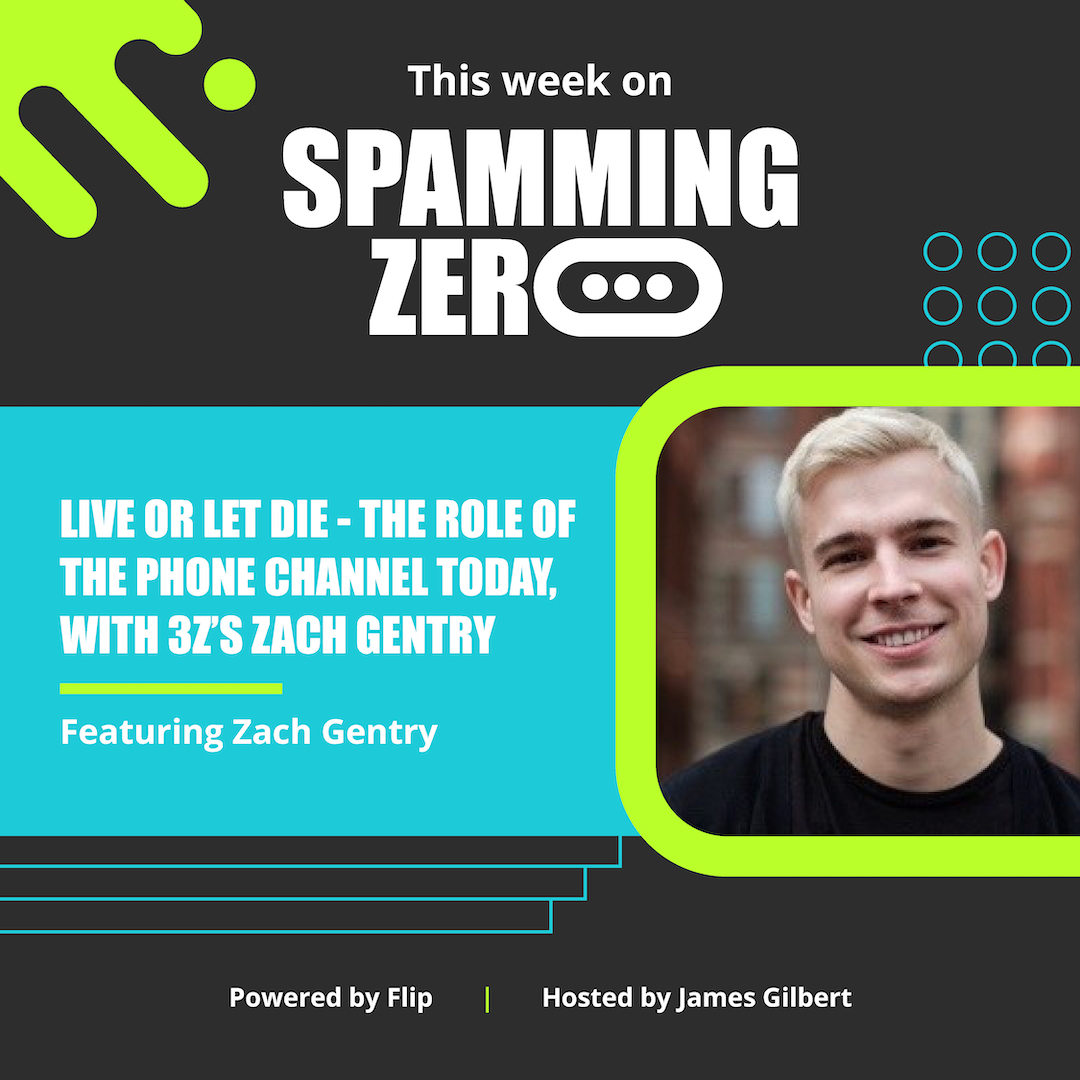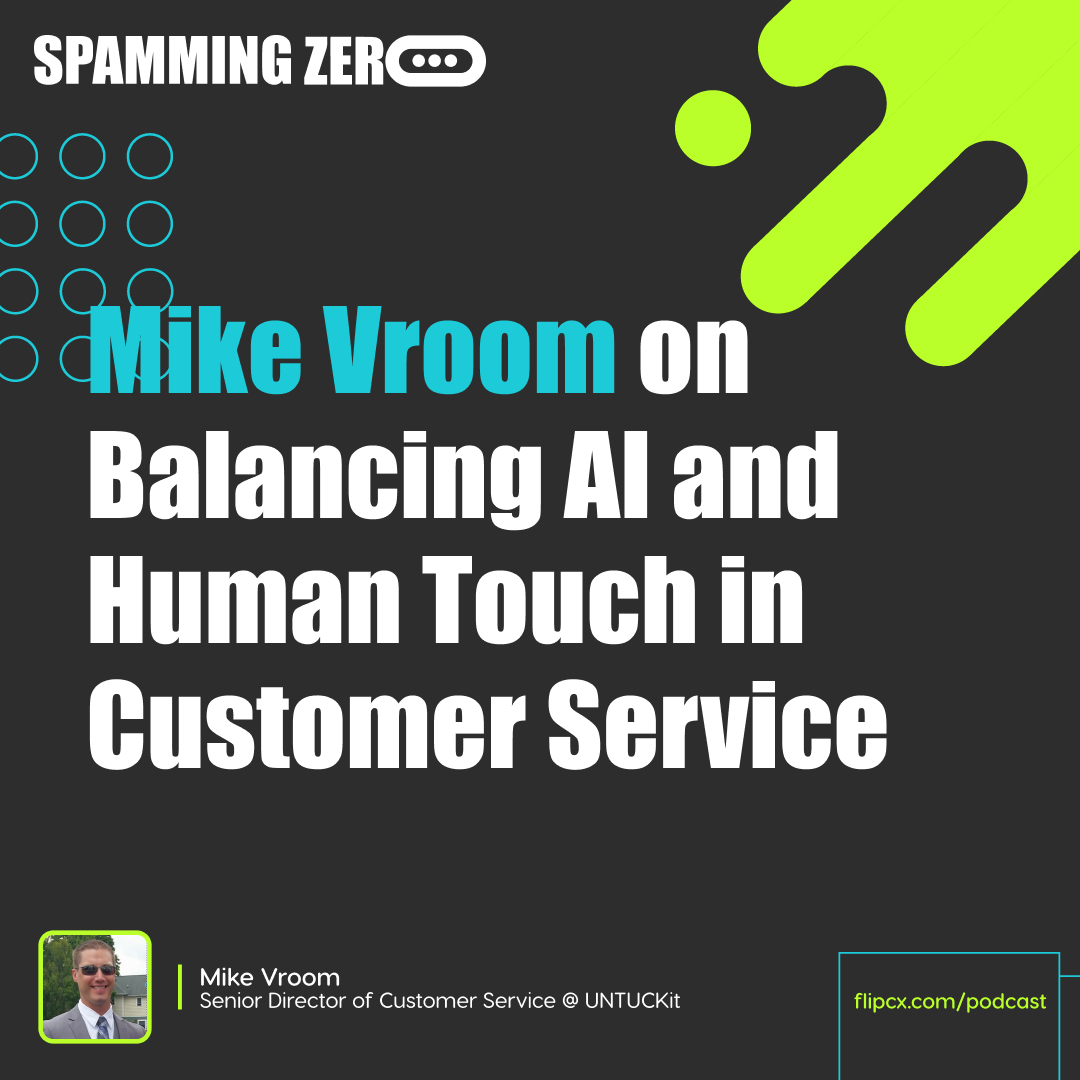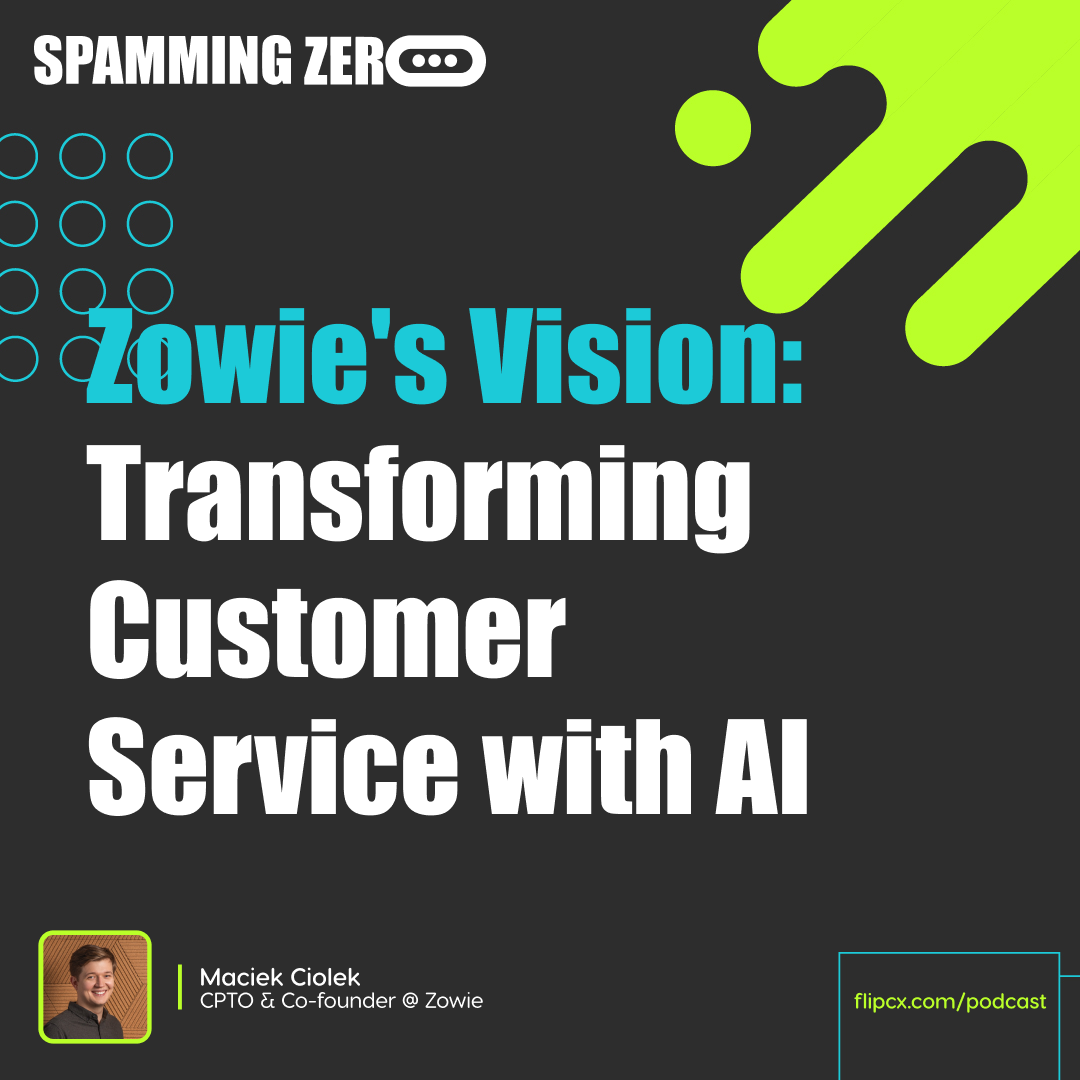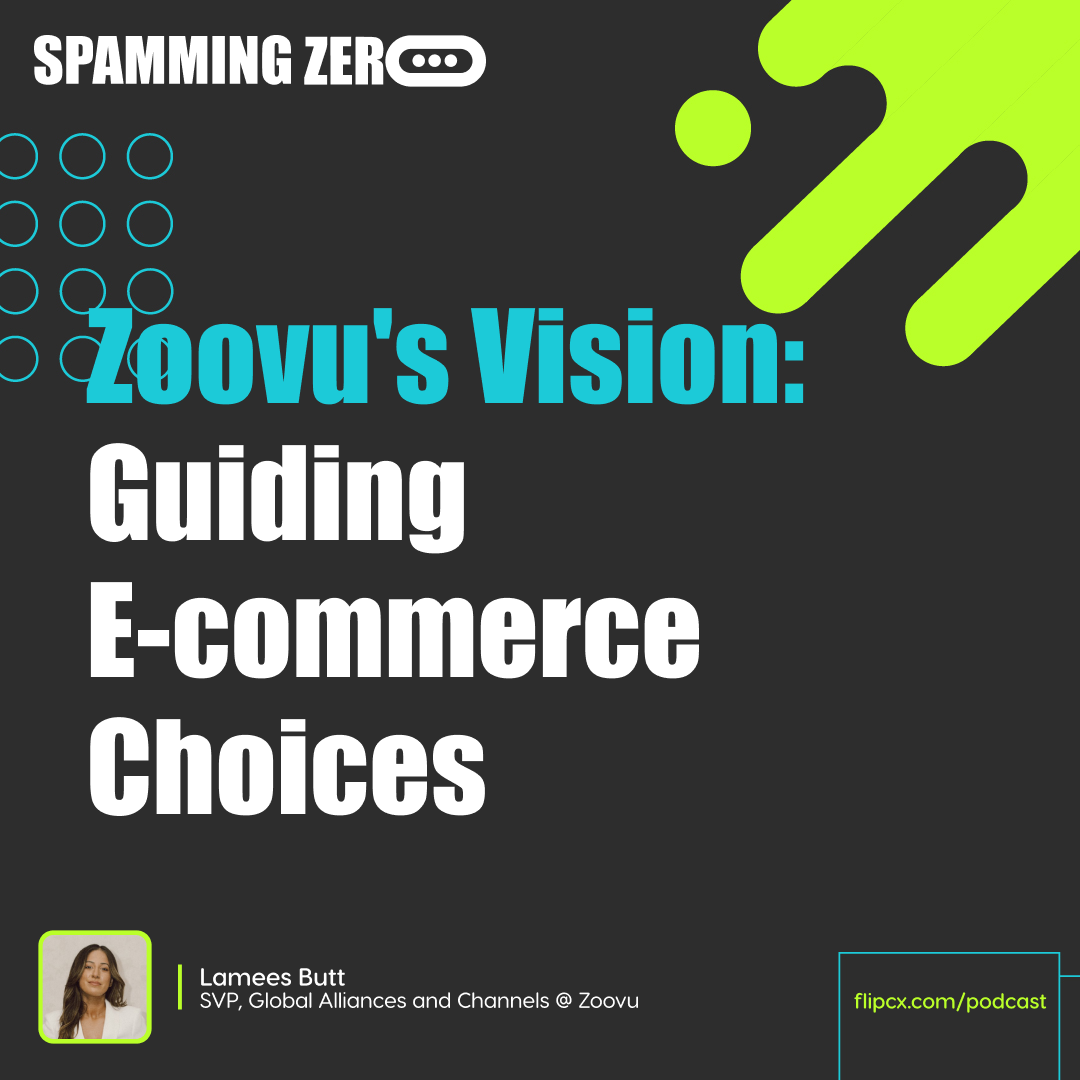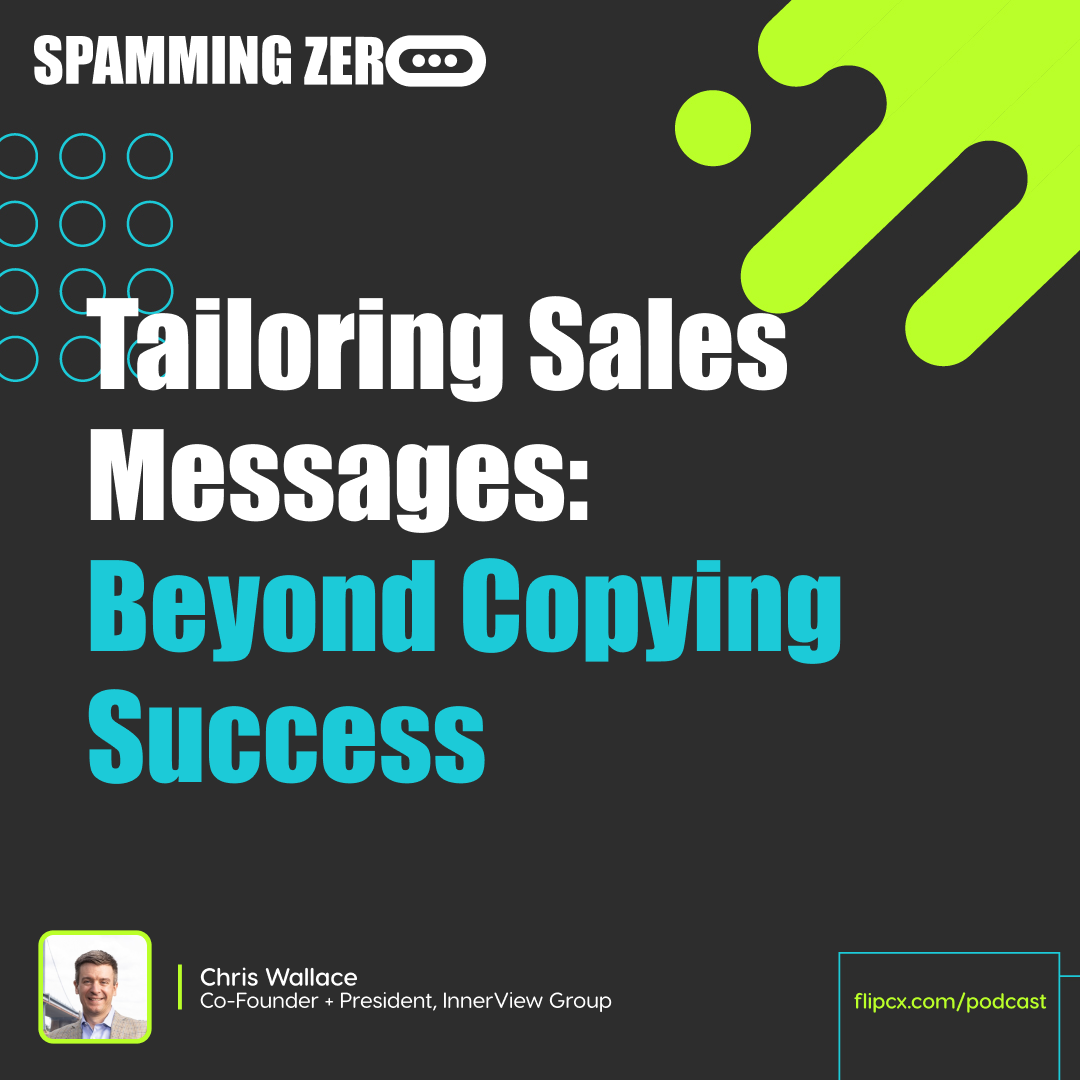Episode 52: Live Or Let Die - The Role Of The Phone Channel Today With 3Z’s Zach Gentry
- 0.5
- 1
- 1.25
- 1.5
- 1.75
- 2
James: What's up everybody? We are in June 2023 and this month's sponsor of the Spamming Zero podcast is Zowie, getzowie. com. So what do they offer? They offer, SMS, email and chat for your customer support. They actually have a few different products that I want to go into just quickly, but also in addition to all that, they're an amazing advocate for AI and teaching people about AI. So they have an entire knowledge center, that's called the AI Knowledge Center. You can subscribe to that. And they provide a bunch of different material on many aspects of AI, not just related to the realm that they focus on, but here's some of their products. The first one is Zowie Automate, Zowie Care, Zowie Grow, and Zowie X1. And I find it really fascinating because their grow product, for example, can turn every interaction that your agent has into a potential revenue stream. It's one of the most difficult things that we can do, is trying to turn those interactions without it seeming like we're hard selling. Zowie helps you do that. The automation piece is pretty simple. Just gets rid of the repetitive tasks. We talk a lot about that at Flip as well. They do it on the email, SMS and chat. They also on their website, have a one- minute chatbot builder. So go play around with that. Again, getzowie. com. I'm James.
Brian: And I'm Brian.
James: And this is Spamming Zero. What's up everybody? Welcome to another episode of Spamming Zero. Today, we're joined by Zach Gentry who runs CX for 3Z Brands. Welcome to the show, Zach.
Zach Gentry: Thanks James. Happy to be here.
James: So tell us a little bit about your background, Zach.
Zach Gentry: Sure. I actually started, my background is heavily in retail, so that's what I kind of started my CX, where I started my CX journey at a grocery store in North Carolina called Food Lion. And then from there it was clothing retail, lots of in and out during college at different brands. And also while I've been in New York for the last 11 years, so I've worked at a lot of different places since then. So customer service has always been kind of a real passion for me because I know how terrible it can be. And then I've also seen the really great moments of it personally that I've given people. So that's, I've been at 3Z for the last five years, coming up in June, and so it's just really something that I think can continue to evolve and with technology can be a real game changer as far as it relates to CX and how you help customers.
James: Yeah, I love your background. I will say, today is going to be a very, very fun topic. I asked Zach before we decided to do the show. I said, " Zach, what's something that's itching at you a little bit that you want to talk about?" And one of the things that he mentioned was, " Is phone going to die or not?" That's today's topic, so we're going to get into it. But before we do, I always like to have our audience get to know our guests a little bit. So last time we were on a video call, I saw a little dog in your background. So what's the craziest thing your dog has ever done?
Zach Gentry: Good question. I'm glad that he's not being crazy right now, because he's chilling.
James: Actually, I kind of want him to. Can you let, can you?
Zach Gentry: No. Because it won't end. Once he starts, it doesn't stop. That's a good question, because he's done a lot of crazy things. But the craziest is definitely, I think when he was five or six months old, a puppy still, he would just hump everything, which as dogs do as puppies. And I was told a method to combat that is put them on their back and they stop. Well, he kind of just threw himself off of the couch that we were on and I was having a glass of wine. It was a Sunday evening, like 10 o'clock, and he smashed into the wine glass and then he started running for me and I was like, " What are you doing? You're getting wine everywhere." And I was like, " Oh no, that's not wine." So he threw himself in the wine glass, cut his neck and he was bleeding all over the apartment. So yeah, I called 911 because I didn't know what else to do and ended up having to take him into dog ER, like animal ER and he had the tiniest little cut on his neck, but I thought that he was bleeding to death because of what it looked like. So my roommate came home to thinking that I had killed someone in our apartment.
James: Well that's a lot more traumatic than I was expecting. I'm sorry for bringing the trauma back.
Zach Gentry: It's actually I don't mind telling it. It was traumatic. But now that I look back, it's actually funny. So it's not too bad to talk about.
James: And what kind of dog is it?
Zach Gentry: He's a Boston Terrier, so usually they're black and white, but he's what they call lilac, which I don't see lilac, but it's like a tote gray.
James: That's like where it's the light tan. Right? I remember it.
Zach Gentry: Mm-hmm. Yeah.
James: It is kind of weird in the animal world how they, I don't know. That's definitely not the color lilac.
Zach Gentry: Classify, I think it's so they can probably charge more money for them or something.
James: Yeah. Exactly.
Zach Gentry: inaudible
James: All right, Zach, so question of the day. Why do you hate the phone so much?
Zach Gentry: So that's a great question and I think a lot of people who are millennials hate the phone in general, but from experience, I've just always had bad experiences. Whether it's with a company, a customer service experience or just like someone's calling you, and it's usually never for a good reason. I just remember being like, " Oh god, my mom's calling me. Why? There's must be something wrong." " Oh, my grandma's calling me, there must be something wrong." And I think that's half of it. So that's personal and trying not to use that as a bias during this conversation. But I just feel like we are trained to call, that's the customer experience. Experience is like, call these people when you have problems and it's just, that's never a good experience for either person because if you're calling, it's like, " I have a problem." And that's never a great way to start off a conversation with anyone. So I think that's kind of where it stems from. And then now that I do what I do, I know that there's better ways that it can be handled.
James: I actually really like the fact you brought up, when your mom calls and your grandma calls, you immediately think something's wrong?
Zach Gentry: Right.
James: Because generally speaking, I think that's very real for a lot of people. People usually pick up the phone when there is something wrong, which that's... We'll get into this, but that's one of the reasons why I don't think the channel itself will ever completely die. But I do think you're onto something here and there is a natural, what I'll call history of bad experiences with this channel. And in my opinion it has gotten worse over the years. But I do think that there's an opportunity for the channel to get better and for it to be an experience that people do remember and recall. But I'd love to hear your thoughts. What do you think could make the channel better?
Zach Gentry: Yeah. That's a good question. And I think why a lot of times that it has gotten worse is because we are trying to fix, we're trying to input a lot of quick fixes with technology. So we don't have as much training and actual conversations about how phone conversations should go. So it's only gotten worse because it's the channel that we're trying to move away from what we still offer. And because we don't offer it as much as we used to, it gets less attention. So, I think a combination of technology that takes place of it and is great, but then there's still this opportunity, as you mentioned, to fix the problems that have never gotten fixed before. And so it's just one of these things that just stays bad and we don't give it attention. And it's like, I don't know, the stepchild. It's the stepchild of the channels. You never had a great relationship with it, so we're just going to leave it to the side and not talk to it as much. That's a terrible, awful real life example because I'm also a stepchild. So I just feel, like you said there is so much opportunity there. And I will say some of the best experiences I've had from CX have been over the phone. They have been over the phone and they've been in person, because a lot of times it actually comes down to the person and how they talk to you. Because I like to be talked to, just a conversation. I hate the super formal because now I'm like, " Okay, this is clearly, this is what I'm expecting." And I'm just like, " Ugh." This is why not.
James: This is scripted. Right?
Zach Gentry: Yeah. Exactly. And I didn't want to call in the first place because this is what I was going to get and I knew it. So when you call in and someone's actually has a conversation, you're like, " Oh, this is how it should be. This is how it could be." But I will say, nine out of 10 times it's not how it is. And I forgot your original question, but here we are.
James: Actually, you hit on it perfectly. Couple more things that I want to dive into. When you talk about the phone itself and how there is an opportunity. One thing that I think about, and I want to get your thoughts on this. So I have four kids. I have a 16- year- old, I have a 14- year- old and then I have a 10 and a 7- year- old. And my 16- year- old and 14- year- old wouldn't pick up the phone and call somebody if their life depended on it. No doubt about it. They do everything possible to avoid. As a matter of fact, my son just got a job and he wouldn't call the store to tell him that he was sick to call in. He texted everybody in his little, in the staff just to find somebody who could cover his shift, all over texts, and he wouldn't pick up the phone and call. I'm like, " Dude, if you're not finding somebody to pick up your shift, you need to pick up the phone and call." And he just refused to. And my daughter's the same way. She's the 14- year- old. But I find something interesting happening between the gap of them and then my two younger ones, and that's this. My two younger ones have adopted voice technology more than ever before. I'm talking about, okay, this might be giving you a little bit too much personal details of my own life, but here we go. They play WWE music on their regular because they're wrestling fans. And so my younger boys, they're sitting there playing their WWE music, they're learning about the world. My son knows just about every fact you could think about when it comes to the deepest lakes in the world. I didn't even know these lakes existed, but my son who is 10, knows they exist. So I think one of the opportunities that we have, is turning the phone channel into a voice accessible channel that is something that people crave. And I think that one of the things that is happening in the world over the last five years especially, is you're seeing an adoption of that voice technology in our homes. People turn their lights on, they do all those kinds of things. Now, even text is when you're driving, you now use voice. " Hey Siri, text my loved one." " Hey Siri, text my mom." Or if your mom calls in the middle of your driving, you're then saying, " Hey Siri, answer the call." So I think that there's an opportunity there that, hasn't yet fully been tapped into and I'm excited about that. I'm also excited about the opportunity that there is, because quite frankly, I have my phone here and I said, " Hey, Siri." And now it's going crazy. But I also think there's a great opportunity for the accessibility side of the house, which that's something I'm personally very passionate about because it is a more accessible channel. And when you look at the grand scheme of things across those with disabilities and the disability community, the voice channel is actually one of the only channels that can serve the majority of that population. So I do think for those reasons alone, I don't think that the channel will ever completely die.
Zach Gentry: Yes, same.
James: Do you think it will completely die?
Zach Gentry: I don't. For that reason specifically and also it's kind of how we're trained. It's something that's so ingrained in us and I don't know if it's, I think it's just a world thing. I don't think it's an American thing. I think it's everyone does it and it's just so woven into the DNA of everything that we do. It's not going to go away. And I think specifically for customer service, online retail or I feel like for some brands they don't have voice and for the reasons that we don't like it but then there's other very important services, such as maybe insurance stuff or the doctor's office, things like that. You still have to do that in a lot of ways. A lot of the services that we use still have not caught up to some of the companies that online retail. For example, you can chat, you can text, there's all these available channels. You can Facebook message, but a lot of people, you can't do that with your primary care doctor or to get your prescription. So it's because we have a generation of older people who are used to calling for everything. And there's still these specific industries that you can only call for. They're not going to train themselves to do text these people and then call these people. It's like, " This is just what I do and this is how I operate." So I don't think it's definitely going to go away. There's no way. And also for my company now, we still have phones and it's not like what channels work best? For some degree, it's like where do your customers want to meet you? Where do you meet your customers? Because if they're wanting it, and maybe it is less efficient for you internally, but your customers still want you to be able to have that channel. So it's like, there's a balance. And that's what customer service is, essentially is what do your customers want? And we know that a lot of our customers want to call us, so that's why we still have it. And even if you don't have your phone number plaster all over your website or a way, maybe the way they ask for a phone call is literally emailing, " Hey, call me." Or chatting, " Hey, call me." So we do that now. It's not like, " No, you don't get a phone call. We don't have it." It's like, "Okay, we meet you or you want to be met." And that's the piece.
James: And I actually think that's the right approach. Because look, I can't speak for, I don't do a huge amount of shopping, for example. I mean, to an extent, of course I do, but I don't do a huge amount to be one of those people that can come in and be like, " Oh yeah, this is a problem." So to speak but there's a lot of people that I'm talking to directly in this space. And one of the things I can tell you is when they're, for example, I'm going to give you a scenario and I'd like you to tell me how you would respond if you were a customer.
Zach Gentry: Okay.
James: All right. So you have a big important meeting coming up in your work and your internet provider has an outage. You go on the online chat, you go to their website, you do the reset button, you do all the things that they say. You unplug your router, you leave it unplugged for 30 seconds, for two minutes, whatever the case may be. You plug it back in, still no internet. This meeting is the most important meeting of your life, this week. How are you responding and how are you acting towards that? Most of the time I think people are going to pick up the phone. " When is this outage going to be over?" Right?
Zach Gentry: Yes. And there's always the update. You always get the email updates or whatever you can, the status website, and it tells you, " It's by this time." Which I think is so funny, this is the question because it's usually that's what the answer is. If they're telling you that on that channel, to be honest, there's probably nothing else that's going to change about it. Maybe it's going to be sooner, but it's estimated by three o'clock. And then you call, email, texts, whatever, and they're like, " Well, it says three o'clock. So that's what the answer is." I hate when people get mad whenever they call and it's say, " Well, that's what your website said." It's like, " Well, that's what the answer is." But that's a good question. First of all, I'm probably going to be going somewhere. I'm probably going to be leaving my apartment to go to the office or maybe a coffee shop or something, because I'm... My dog's going crazy. But I probably will call immediately for something like that. And that's just because like I said, we are trying to do it. It's kind of the last resort. I'm going to do everything else first and if I can't get ahold of anybody, I'm going to try and get ahold of someone that way.
James: And I know this sounds crazy, but I think that the consumers and customers, even though that particular scenario with the internet is much more serious in nature, in my opinion, than ordering a product. However, what I will say is during peak season, for example, when people's memories and their experiences with their families are relied on by ordering a product that they are told is going to be delivered to them at a certain time. It almost becomes that serious. Right? And I think especially during those times, that's really when phone is needed. And you're right, nine times out of 10, you can find the answer. It's usually in your order. It tells you when it's going to be there. But sometimes there's delays in that stuff, and the company could do their very best job in updating it. But even the biggest retailer in the world, I mean, I don't even know if you can consider them a retailer like distributor in the world, Amazon. Even they have issues with this. Where during peak seasons some things just don't get delivered because, well, I don't know, maybe the nation is having a massive amount of terrible weather and their people can't get to you in time. So I do think that having the phone channel accessible always is super important for all the reasons that we've been talking about. But I do think generally speaking, the population would rather not call the phone.
Zach Gentry: Yeah.
James: A hundred percent. And I have this vision of it eventually becoming something that people will actually love again. And I think it could. It could. That's the key word. But Zach, I want to shift gears here for a little bit. We're going to do a little game. Sound like a plan?
Zach Gentry: Good. Sounds good.
James: All right. So I'm going to ask you to fill in the blanks. Here we go. Customer service needs more of blank and less of blank.
Zach Gentry: More empathy and less phones.
James: Right on topic. I love it. Okay. If it was the last day on earth, I would still shop at blank because it's blank.
Zach Gentry: This is a good question. I would probably say ASOS because it's cheap, however, it's not going to get to me because it has to ship. So I guess, that's a lot inaudible
James: But you would still shop there and it would be delivered after the last day on earth.
Zach Gentry: Half of the fun is just the scrolling and adding it to your cart, honestly, but yeah.
James: I love it. Okay, one more. If you had to describe the perfect customer experience using a movie title, what title would you choose and why?
Zach Gentry: I would say Superstar, because I honestly feel such a passion about the person giving you the experience. Most of the time I will, just from my experience and also how I train and talk to my team, it does come down to the person. And so whenever you have superstar like CX people, it makes such a difference because you can come in guns blazing, pissed off, out of your mind, and it doesn't matter how much training the person has as far as, " This is what I can do for you, this is what I can't do for you." It's something that can't be taught. It's really much a, I mentioned empathy before. Are they empathizing with the issue that the person might have? Are they doing everything they possibly can? Not everything they tell you that they can do, but are they actually doing everything they possibly can to turn around your experience? Or maybe it's not turning it around. Maybe it's just delivering an amazing experience, a superstar experience that it maybe leads you to buy something, maybe doesn't. But I really enjoy those conversations, that are that conversations and not like the scripted going through the motions. Yeah, I think that's a good-
James: That's a good one. Zach, I want to ask a couple more questions while we have time. One of the questions that I have for you is, what do you think direct- to- consumer brands can do today? To, one, can make sure that their phone channel is accessible and maybe provide the option of other channels for those that don't want the phone. What do you think they can do today? And number two, what do you think that they need to do internally to help their staff understand why it's still important, even if they have, for example, a younger generation answering calls and hate it?
Zach Gentry: Yeah. So for the first question, I think that, I mentioned this before, but meeting the customers where they want to be met is so important. I look at a lot of brands and I see what they offer. Some of them offer phones 24/7 and that's great, but I don't necessarily know if... I don't know those brands. I know that some people would get phone calls every day, some people may get a few every hour, I don't know. But if you're looking to be like, however you're set up internally, I've mentioned this and this, I don't like the phones, but as productive as you can be, that's great, love that. But at the end of the day, if someone's telling you that they need something, which I mentioned we did, the phones, you have to just be able to offer that at some capacity. And it also depends, I think it really depends on the product. So if you're, like I mentioned before, maybe it's a service, but if it's something that's maybe not as expensive, my company sells things that are thousands of dollars. So I have a lot of people who don't trust just clicking a button and checking out. They want to talk to someone, they want to talk to someone about that$ 3, 000 are about this place. And also, we used to hear this a lot before we had the phone channel was like, " How do I know that you're going to not just take my money and then when I actually have an issue and I need to call you, you're going to respond?" And so I was like, " Actually, that's a good point. You don't want to got to just take your money and then not be available for you whenever you have issues." And so you just, like I said, meeting them where they need to be met. And then the second question, I think, so I think a lot of the people that I've trained in, that I've been on my teams now and in the past, they are either similar age or younger than myself, and they have the same anxieties and we don't know what they're going to say when we pick up the phone. It could be anything. I'm like, " Yeah." That's kind of why I like it. But then again, like, " What's going to happen today? It's never the same." And what we talk about a lot, is a lot of the issues that we see, some of the unproductive things when that come with chat and email is you just going back and forth and it's like, " Okay, I think if I just call this person, I could explain this to him in three seconds." To make a case for phones. It's not that I want to do that.
James: Zach, we've got him to switch. Can you imagine that? It took 25 minutes.
Zach Gentry: Whenever we introduce them, our first response time decreased by 60%, because phone calls can be really quick. They can also be really long, they can be extremely long, they can be 30 minutes or whatever an hour. But when you're going back and forth with someone on email, I've just had to tell agents on my team such, " Just call them. It's clearly not getting through to them. Maybe there's miscommunications on your part, maybe they just don't get it." And then they're like, " Oh yeah, that was a lot faster." So that in itself, when I explained that to them, and they obviously have that experience, they're like, " Yeah. You're right." Because we can't treat every customer the same. Because you want to, actually when I worked at Eddie Bauer, which was something that I will always remember. Their motto was, " Treat every customer the way they want to be treated." And so I kind of sticks with me and has throughout the last, oh god, 16 years, 16, 17 years. And I think that's applicable there too in CX, it's not just those products, that can be shared across any brand or any service.
James: Interesting that you bring that up. That is actually, so growing up, that was a motto that my mom lived, taught us when we were young. We grew up really, really poor and she always taught us to treat others the way that you want to be treated because you never know when you're going to need it, when you're going to need it in return. And I love the fact you've mentioned empathy on this call, as one of the things that customer experience needs more of. Customer service needs more of. And I love the fact you're now bringing a full circle with that and that's like treat the customers you want to be treated because I do think that's true. I think that there's a lot of repetitiveness that happens when you're handling calls and sometimes it's the same stuff over and over and it can get frustrating. This is where I think automation can really help. So where do you think automation fits in the picture? Does it fit in the picture? Should it be killed with the phone? Where does it fit?
Zach Gentry: I definitely think, I don't think it should be killed. I think we need more of it. I think a customer experience should be that you have enough technology information, whatever your website is, so that the customer can help themselves. Because we mentioned in the beginning it's like, maybe I hate phones for answering them, but also customers don't love to call either. So as much information and whether it be technology or just information itself, you have to have that so that you're getting less phone calls and so then you're more productive and also your customers are having better experiences, because they're not spending their time trying to track you down for simple answers or simple things. I'm a big fan of brands that have accounts. So if you can cancel your own order, amazing. I understand the argument against that from a business perspective, but it makes it so much easier if you need to change your billing address or your shipping address. Being able to do that yourself, so much easier. Just needing a shipping status update. Don't have to call. I can just plug in my information and then it spits it out. I love that.
James: Same. Obviously.
Zach Gentry: Yeah, it's so fast.
James: The only time that I think I've ever had to cancel my order was literally due to an emergency. I forgot to update my shipping address. It was going to go to the wrong address or it was going to charge the wrong credit card. I mean, every single time that I've ever had to cancel or here's a good one. Coming full circle on when I talked about how my younger ones want to use the voice channel. My 10- year- old ordering$ 3, 000 of Amazon stuff through Alexa and I had to call and cancel it all because it was an emergency. Of course, I'm not going to let him buy everything that he could possibly want, all in one scoop.
Zach Gentry: Oh my god. Was it actually stuff that he wanted or was it just random stuff?
James: No, it was stuff that he wanted. He had been building this list for a while, and then he just was like, " I wonder." And he is like, " I'm going to see if it will actually buy." And so he did it and then I had to put all these settings on to make sure that, he didn't do that again. But it was, he had some good stuff in there. I mean, if I was a kid, I would've loved it. It was like this$ 300 hot wheel set. I didn't even know that stuff like that existed. That was that expensive.
Zach Gentry: You do now. That was all hint for you for next Christmas.
James: That's exactly right. We may have gotten him less for Christmas just because of that. So Zach, couple more questions and then we'll finish it up. But the last question I have before I end with the last one is this. What is a brand that you think is doing this really, really well right now? The balance of a phone channel that either needs to exist for the purposes of it being accessible and having other channels accessible to people that want to use a preference?
Zach Gentry: That's a good question. I will say, that I haven't had a ton of issues with any company for the most part, unless I already mentioned them, which I don't think I have. But there's a lot of retail brands that do this well. Specifically I've interacted with the Greats, which is a sneaker brand, and they actually do have both channels and I have interacted with them several times, whether it be with, where's my refund type of question or just asking about general differences of product. I'm a chat person, so I went to chat. I did call them once. I think it had something to do with a return or something, I don't know. But I remember it being extremely easy and seamless and they just have cool stuff too. So that's how they got me. So-
James: Awesome.
Zach Gentry: ...I think they're doing well. And again, not knowing that I don't have to call them already makes the experience, just great because I probably won't.
James: Yeah. And if you did have to call, having the automation set up to where quick answers can be answered without actually interacting with a human, which by the way, there is, there's some stats out there, and I'm not going to quote the exact number because I don't have it handy and I don't want to give inaccurate information. But I will say that the majority of people, when they pulled a bunch of people across the US, the majority of people would actually still prefer to call the phone if they didn't have to interact with the human. Which is it's actually counterproductive to what we often hear, which is human- like experience, which we all want, but there's still a general premise of people wanting to avoid interacting with the human when it comes to their transactions and the things that they're buying and doing. If you want to avoid it, you're going to try to do everything you can to avoid it. And if you want to interact with the human, you typically want to do it first in channels that are a little bit more self- serve, like the website and then the chat. And then when you really need your problem answered and you can't get it in those other channels, then you call the phone. You hope that the automation can take care of it, and if it can't, then you need to talk to somebody live. I think that's generally the journey that most people want to go down. Zach, we're going to end with this question. I ask every guest this question and I'd love for you to chime in on what you feel like is one of your most memorable experiences that you've had with the brand.
Zach Gentry: Good or bad?
James: It can be both.
Zach Gentry: Honestly. I've had, so I'll start with the good. I guess this is actually good and bad. Just kidding. So whenever I moved to New York, I was still in my parents Verizon account, and it was also my stepdad had his own business, and so he had employees that worked for him. And so there was I essentially, a business account and there were so many numbers on it. And so I was calling them to try and basically upgrade and then also get myself off that account because they were like, " We're not paying for it anymore. You're an adult now." I'm like, " Damn."
James: Oh, slam. That's messed up.
Zach Gentry: I was trying to do that. And I remember it was, I was working retail all the time and it was my day off and I think it was a day of the week. It was a Tuesday or a Wednesday or something like that. And it was just like I had to call, so that was out of the question. So I was already pissed. I was like, " Well, I have to call. I can't do this over the chat thing, or you can upgrade your phone with a click of a button and then it's all set." But because they were so confused, they were confused. So if they were confused, imagine how I was like, " Well, if y'all don't know what you're doing, then I clearly don't." So I had to call them, spoke with one person. They were like, " I don't understand what number you're trying to remove or separate from whatever." And then it was like that. And I was like, " Okay, let me speak to someone else. Let me speak to someone else." And I'm not, let me speak to your manager person because I hate that question. But after the sixth, or I was on the phone for over two hours, maybe not on the phone, but I was calling back. And so after maybe the fifth or sixth person, I was like, " Okay, I need to speak to someone who can help me. This is the craziest..." I was probably, I don't get upset because I have empathy for those people because I understand, but no one could help me. It was literally, " We can't help you for this." But they help you do this. But it was also like, " What do I do?" And there was no answer to that. So I was like, " Screw this. I'm just going to go to the store." So talking about channel switching, so not wanting to come to leave your house to go actually, and thankfully I live in New York, so there's a million Verizon stores around. So I was able to just walk to one and I walked in and this guy, I don't know if he was the manager, if he was just an associate there. I think he had mentioned the fact that there were so many numbers connected or whatever was happening, but he just like, I was in and out in 10 minutes, 10, 15 minutes. And I was just like, " I don't really understand." And to this day, I don't know what he did. But I will say, I was like, " Give me whatever survey that you need me to find out, flag for you. Tell whoever that you were amazing." But going from that to that, yes, it made the experience better. I don't know if anything would ever recover that because that was awful, but it was just so fast and I should have done that to begin with. And to be honest, if I have the chance to do, usually when I get a phone upgrade thing and I have the chance to go in person, I'll usually do it then because they can also put your phone screen on for you, put on protector and all that too if you need it. So I feel like, I don't know if the experience flipped, but it definitely was one, two memorable experience. I'll never forget where it was the opposite experience at the same company.
James: What's crazy is I think that there's a lot of people that, especially in this space, that talk about lifetime value of a customer, and it's often thought about by how much they purchase from your company over a period of time. That's usually how it's calculated. But there's a whole nother piece of this that I think often doesn't get talked about, and that's the opportunity cost that happens when a customer is using their own time to actually get a problem solved, that shouldn't have ever been a problem to begin with. Imagine what you just said. You were able to get your problem solved in 15 minutes with this person, in person, but you spent two and a half hours on the call. So this is an example of where I would, in an ideal world, I could see customer service and customer experience professionals start tracking like, " All right, well." Let's say Zach's hourly wage is$ 500 an hour. I'm exaggerating here, but maybe it is, I don't know. But let's say it's$ 500 an hour. So that's at least a thousand dollars if you're spent two hours on the call, that you now costed him and truly proactive experience, and making those situations right, doesn't always need to be monetary, but maybe the future of customer service and customer experience will be that. I think that people will start demanding more and they'll be like, " Listen, listen." Because for me, I can tell you, and I've talked a lot about this on the podcast. But it drives me wild when I'm working at a certain time every day, and I typically don't take a ton of breaks to go do some of the stuff that I need to do for my own personal life. If I need to call my bank or I need to call whoever, I have to do that out of my workday, and then I have to spend my family time doing the stuff that I maybe needed to get done during the day. And so there's this also balance of what you're actually costing people when you can't answer questions quickly, and it's much bigger than just, " Oh, well, we might lose a customer here." It's much bigger than that. Because to them, that's the reason why I think a lot of customers will complain about a situation you like you have with Verizon. That's why they'll complain in public about it because you wasted their time. You cost them time, which is way more than you're actually thinking it is, than just like, " Oh, sorry, we couldn't answer your questions." No, it's bigger than that. Right? And I think this lifetime value thing of a customer should probably consider some of that in some ways. I don't know if it'll ever get there, but I love that you brought up this experience.
Zach Gentry: Yeah. I would also love, I'm not a math person, but I would love how to have a calculator of that. If you take all maybe your missed calls or your missed chats or something, how long it took you to respond to them, or maybe there's specific examples that you find that during QA or something that just the agents just weren't helpful. Maybe it was 20 minutes and you're just like, " I wonder how much putting all that data into a calculator." I'm like, " This is how much we cost these people." That'd actually be super interesting, but I have no clue how that would even come about.
James: Well, even if you took the United States measurement of the average hourly wage, and that's all you did was the average hourly wage against that, it'd be a pretty interesting metric to say, " Look, people spent on average 40 minutes on the phone with us." So you calculate that across$ 7 an hour and there was X amount of customers. That's a pretty easy math problem to do on a calculator. And then you look at, you measure, let's say each month you make an incremental improvement where you drop that by 10 minutes and then you can actually, you could say that to customers, be like, " We did some research on average, the average hourly wage is$7 an hour." Whatever. I actually think it's much higher than that, but let's say it's$ 7 an hour. " We think we've saved customers this amount of money just by solving their problems quicker." And that's going to resonate with a lot of people. I think that's something I would like to see in the future. I have never seen it done, but anyway, I digress. Zach, you've been amazing. Thank you for joining on the show.
Zach Gentry: Of course. Thanks for having me. This was a lot of fun. I haven't done this before, so I loved it.
James: You did great. You were a natural, and by the way, I should say this. I meant to say this in the beginning of the podcast, but Zach, by far has the best background that we've ever had on the podcast. I mean, he literally looks like he set this thing up. It's beautiful. What the heck, man?
Zach Gentry: It's glowing girls inspired, so.
James: I love it. Zach, thanks again. And join us next week for another episode of Spamming Zero. If you haven't yet subscribed, please do so. I'd love to hear from you. Also, if you want to hear from a guest or a particular topic, reach out to me on LinkedIn. Also, we'd love for you to rate the podcast, give it a star rating, and let us know what you think. Thanks.
DESCRIPTION
Let’s dive right in and address the elephant in the call center…
Is the phone channel dying?
Director of CX at 3Z Brands Zach Gentry has mixed thoughts on the subject, and he provides some pretty fantastic food for thought. This week, on Flip CX’s Spamming Zero Podcast.
What’s Covered?
- A bit about Zach’s background in retail
- Why our expert isn’t a huge fan of the phone
- Top suggestions for improving phone as a channel
- Predictions on where phone—and automation around it—are headed
- Accessibility for all customers
- Creating more empathy in your CX
- Examples of brands who are balancing their channels beautifully
- And more
Ready for more fantastic Spamming Zero conversations ahead? Listen, rate, and subscribe on YouTube, Casted, Apple Podcast, or Google podcasts.
Today's Host
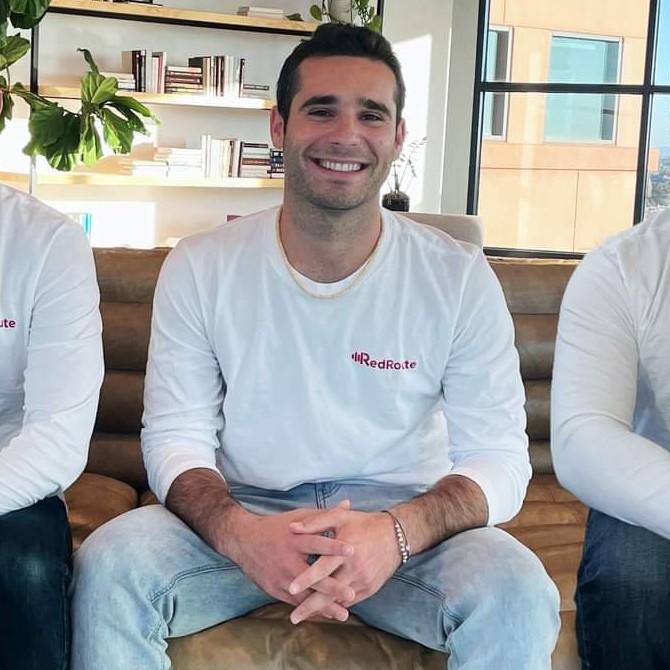
Brian Schiff
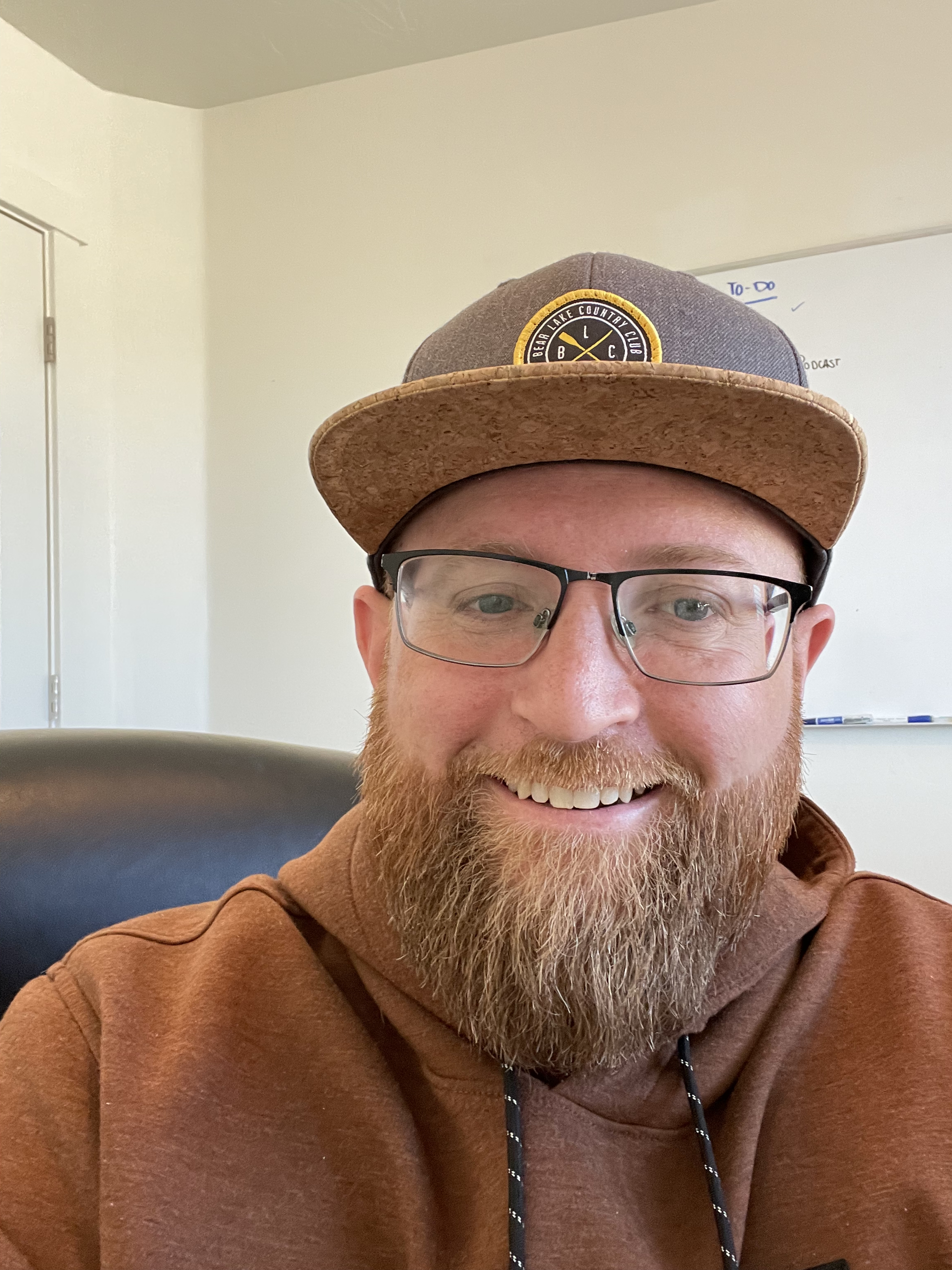
James Gilbert
Today's Guests


